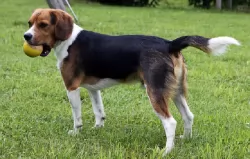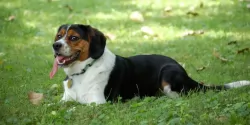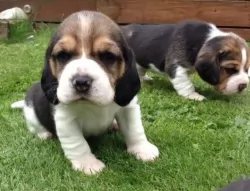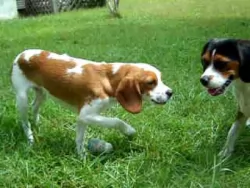 MyDogBreeds
MyDogBreeds German Spaniel is originated from Germany but Beaglier is originated from Australia. German Spaniel may grow 14 cm / 6 inches higher than Beaglier. German Spaniel may weigh 15 kg / 34 pounds more than Beaglier. Both German Spaniel and Beaglier has almost same life span. Both German Spaniel and Beaglier has same litter size. German Spaniel requires Moderate maintenance. But Beaglier requires High maintenance
German Spaniel is originated from Germany but Beaglier is originated from Australia. German Spaniel may grow 14 cm / 6 inches higher than Beaglier. German Spaniel may weigh 15 kg / 34 pounds more than Beaglier. Both German Spaniel and Beaglier has almost same life span. Both German Spaniel and Beaglier has same litter size. German Spaniel requires Moderate maintenance. But Beaglier requires High maintenance
 Looking like a smaller version of the Red Setter, the German Spaniel, known also as the Deutscher Wachtelhund or German Quail Dog, hails from Germany.
Looking like a smaller version of the Red Setter, the German Spaniel, known also as the Deutscher Wachtelhund or German Quail Dog, hails from Germany.
It isn't a new dog breed and in fact it was developed around 1890 already. Used as a hunting dog, the German Spaniel isn’t well known outside of Germany, but it was recognized by the United Kennel Club in 1996.
There are a number of breeds which feature in the development of the German Spaniel, and one of the more prominent dog breeds used for the modern day German Spaniel is the extinct Stoeberer. The Stoeberer was crossed with water dogs and sporting spaniels to bring about the modern German Spaniel as we know it today.
It was in 1903 that the dog was recognized as a breed, and in the 1960s and 1970s the dogs were imported into the United States.
 The Beaglier beginnings are set in Australia. Before around 30 years, breeders cross-breed the Beagle and the Cavalier King Charles Spaniel. The result actually turned out great – new we have a small sized breed with a wonderful, soft coat, very likeable looks, the calm and gentle dog which is very active despite his relaxed nature. They can be found around the globe nowadays and they are very popular because of their sweet nature.
The Beaglier beginnings are set in Australia. Before around 30 years, breeders cross-breed the Beagle and the Cavalier King Charles Spaniel. The result actually turned out great – new we have a small sized breed with a wonderful, soft coat, very likeable looks, the calm and gentle dog which is very active despite his relaxed nature. They can be found around the globe nowadays and they are very popular because of their sweet nature.
 As a medium-sized, muscular dog which stands at roughly 45cm to 54cm in height and weighs 18 – 25kg, the German Spaniel is a sporty gun dog who has a long back in relation to his height.
As a medium-sized, muscular dog which stands at roughly 45cm to 54cm in height and weighs 18 – 25kg, the German Spaniel is a sporty gun dog who has a long back in relation to his height.
The ears are long and floppy with wavy or curly hair that will need to be attended to so as to avoid matting.
He has a long, wavy or curly weather-resistant coat, being short on the head but with feathering around the legs and stomach. Color of the coat includes brown, reddish brown and white. The white markings can be found on the chest of the dog, the legs, tails and muzzle. `
The German Spaniel loves to work and be busy and if he can be included in his human family’s activities, then so much the better. He is a social dog and gets on well with other dogs as well as children in the home. The German Spaniel is an intelligent dog and easily trained. In fact training and socialization are important for him, making him obedient and a pleasure to have around.
 This small dog breed, called Beaglier and Beagler, has the look of his parents. Sometimes, they look more like the Spaniel, and sometimes they look more like the Beagle. This actually means that they are usually small, but can be, in some cases, even medium sized dog. They are usually tricoloured and in most cases, they have dark brown and cream hairs with white markings. They have longer ears, sometimes with more hairs if they look more like the Spaniel. They have large, dark brown eyes and usually dark nose. This breed is very loving and affectionate. They have a high need for a daily activity and they are the best choice for families with children.
This small dog breed, called Beaglier and Beagler, has the look of his parents. Sometimes, they look more like the Spaniel, and sometimes they look more like the Beagle. This actually means that they are usually small, but can be, in some cases, even medium sized dog. They are usually tricoloured and in most cases, they have dark brown and cream hairs with white markings. They have longer ears, sometimes with more hairs if they look more like the Spaniel. They have large, dark brown eyes and usually dark nose. This breed is very loving and affectionate. They have a high need for a daily activity and they are the best choice for families with children.
 The German Spaniel makes a wonderful family pet. He is friendly and sociable, getting along well with just about all dogs and people. He loves his human family, wanting to be involved in all their activities.
The German Spaniel makes a wonderful family pet. He is friendly and sociable, getting along well with just about all dogs and people. He loves his human family, wanting to be involved in all their activities.
He is an active dog, used to hunting and being outdoors and he will therefore require a good deal of exercise from his owners, otherwise he becomes bored and frustrated and even destructive.
He is an adaptable dog, living in the city or the countryside, but wherever he is, exercise is important. Docile and non-aggressive, he has got all the characteristics that make him a splendid family pet.
 If you decide to bring a Beaglier to your family, it will be the best that you wait for your children to grow up a little bit. They are great to play buddy, but they get carried with the game and they can be very careless during the play. They fit perfectly with the children above the age of 5. They will run, jump, and do whatever your kid is about to do. They are friendly towards children they don’t know but they don’t do well with other animals they don’t know.
If you decide to bring a Beaglier to your family, it will be the best that you wait for your children to grow up a little bit. They are great to play buddy, but they get carried with the game and they can be very careless during the play. They fit perfectly with the children above the age of 5. They will run, jump, and do whatever your kid is about to do. They are friendly towards children they don’t know but they don’t do well with other animals they don’t know.
watchdog
One the main reasons why Beagliers are so much popular lay in their adaptability to any living conditions. They will fit in instantly in a family with children, but they will be happy as well if they live with just one person or even seniors. They can live indoors, houses and apartments without the yard. The Beaglier will enjoy the city parks, dog parks, beach, walking down the crowded streets. This breed is a not a quiet one – they will bark every time they notice something just to let you know. But, they are not aggressive type and they usually bark to communicate with people.
Usually, they are trained very easy. They have a stubborn nature, and if you learn how to get over with this temperament, you will be able to train and raise the sweetest dog ever. They should be trained and socialized while they are still puppies. Since they like too much, the best advice is to use treats to teach them everything that they will need to know. But, be careful with the feeding after the treats – Beagliers get easily obese if they are overfed.
 Health problems are fairly unknown with the robust German Spaniel, and if well cared for, he can reach 12 to 15 years of age.
Health problems are fairly unknown with the robust German Spaniel, and if well cared for, he can reach 12 to 15 years of age.
There are always one or two hereditary health concerns, and the health issues that affect the breed the most are hip dysplasia, skin allergies and splayed feet.
The American Kennel Club tells us that this type of foot is flat, with spreading toes. It is a fault in your pet because it doesn’t support his weight well, causing health problems later on for your pet. This is why it is so important to have your pet’s nails clipped from time to time, because long nails can turn a good paw into a splayed one, actually injuring the tendons.
 The Beaglier flap ears can be a very great place for the fungi, bacteria and dirt. You will have to clean their ears with an ear cleaning solution and a soft tissue once a week, especially if your pet is playing outside.
The Beaglier flap ears can be a very great place for the fungi, bacteria and dirt. You will have to clean their ears with an ear cleaning solution and a soft tissue once a week, especially if your pet is playing outside.
Cherry eye: Starts as redness in the corner of the eye. Happens when the third eyelid gland slips out of its place and show up as a red blob in the corner of the eye. Sometimes, the gland gets back to its original place in a couple of days, but it will be the best if you can take your dog to the vet as soon as you notice any readiness in his eyes.
Glaucoma: Happens because of the high eye pressure. This affects the normal outflow of the eye fluids and can cause blindness if not treated. It is the best to for your beagle to regular eye checks since this condition is not easy to diagnose in the begging.
 Shedding quite heavily and seasonally, the German Spaniel’s thick coat will require being brushed twice a week to keep it shiny and healthy. He loves the attention you give him at the same time.
Shedding quite heavily and seasonally, the German Spaniel’s thick coat will require being brushed twice a week to keep it shiny and healthy. He loves the attention you give him at the same time.
There are some German Spaniel owners who like to take their dogs in for professional grooming, requesting that the coat be cut short all round.
The long ears of your German Spaniel, especially if your pet spends a lot of time swimming, can be permanently damp, picking up dirt easily. Check inside the ears and make sure they are dry and clean to prevent ear infections.
Make sure to brush his teeth 2 or 3x a week as well because plaque build up leads to dental disease but it also negatively affects other body organs too, shortening your pet’s life.
Every dog, just like any human being, requires good nutrition, fresh water and warm, dry sleeping facilities to remain happy and to give him a good chance at longevity.
Apart from the very best commercially manufactured dog foods, ensure he occasionally gets some raw meat in as well as some cooked brown rice, vegetables and chicken. These can be added into his kibble.
 If you are not sure about the dog food you should give to your Beaglier considering the living environment and the lifestyle, it is always the best option to listen to the vet’s advice. They are prone to the obesity so you should keep a schedule that won’t be changed much. Feed them every day at the same time, no more than two meals per day once they get older than 6 months.
If you are not sure about the dog food you should give to your Beaglier considering the living environment and the lifestyle, it is always the best option to listen to the vet’s advice. They are prone to the obesity so you should keep a schedule that won’t be changed much. Feed them every day at the same time, no more than two meals per day once they get older than 6 months.
If you want your Beaglier to be happy, make sure you groom him daily. You will need about 5 minutes per day to brush him and keep him out of the tangles. Bathe then once in a month, that will be enough. Clip their nails regularly. Keep their ears cleaned.
They need a daily activity or they will get destructive. Be careful with the feeding since they get obese very quickly.
Since they are natural hunters, they will like to play chase. You can take them to the woods for a walk or for a run but make sure you train them to respond to your commands before you take them off the leash. They are very curious and they will easily wander off. They can be taught to play inside the house as well. They love to explore new areas so it will be great if you can take them with you for a holiday.